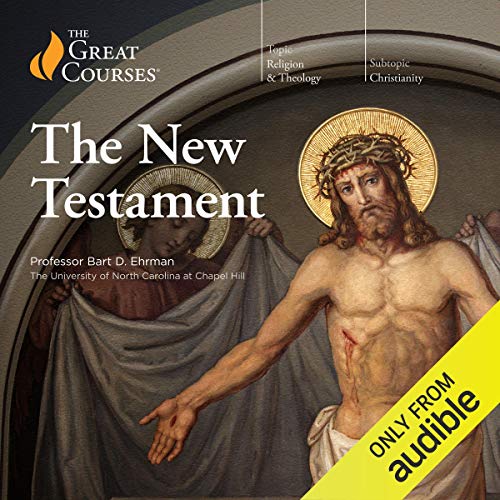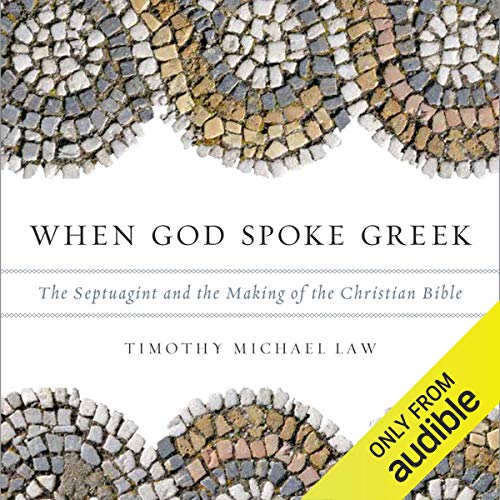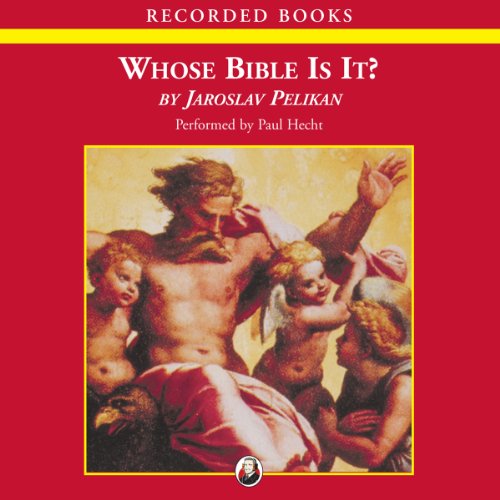
 Audible sample
Audible sample  Playing...
Playing... 
 Paused
Paused  Your audiobook is waiting!
Your audiobook is waiting!
Enjoy a free trial on us
$0.00$0.00
- Click above for unlimited listening to select audiobooks, Audible Originals, and podcasts.
- One credit a month to pick any title from our entire premium selection — yours to keep (you'll use your first credit now).
- You will get an email reminder before your trial ends.
- $14.95$14.95 a month after 30 days. Cancel online anytime.
Buy
-12% $34.96$34.96
Forgery and Counterforgery: The Use of Literary Deceit in Early Christian Polemics
 Audible Audiobook
– Unabridged
Audible Audiobook
– Unabridged
"Arguably the most distinctive feature of the early Christian literature," writes Bart Ehrman, "is the degree to which it was forged." The Homilies and Recognitions of Clement; Paul's letters to and from Seneca; Gospels by Peter, Thomas, and Philip; Jesus' correspondence with Abgar, letters by Peter and Paul in the New Testament - all forgeries. To cite just a few examples.
Forgery and Counterforgery is the first comprehensive study of early Christian pseudepigrapha ever produced in English. In it, Ehrman argues that ancient critics - pagan, Jewish, and Christian - understood false authorial claims to be a form of literary deceit, and thus forgeries. Ehrman considers the extent of the phenomenon, the "intention" and motivations of ancient Greek, Roman, and Jewish forgers, and reactions to their work once detected. He also assesses the criteria ancient critics applied to expose forgeries and the techniques forgers used to avoid detection.
With the wider practices of the ancient world as backdrop, Ehrman then focuses on early Christian polemics, as various Christian authors forged documents in order to lend their ideas a veneer of authority in literary battles waged with pagans, Jews, and, most importantly, with one another in internecine disputes over doctrine and practice. In some instances a forger directed his work against views found in another forgery, creating thereby a "counter-forgery." Ehrman's evaluation of polemical forgeries starts with those of the New Testament (nearly half of whose books make a false authorial claim) up through the Pseudo-Ignatian epistles and the Apostolic Constitutions at the end of the fourth century.
Shining light on an important but overlooked feature of the early Christian world, Forgery and Counterforgery explores the possible motivations of the deceivers who produced these writings, situating their practice within ancient Christian discourses on lying and deceit.
- Listening Length25 hours and 27 minutes
- Audible release dateJanuary 21, 2014
- LanguageEnglish
- ASINB00HQ0SQ3U
- VersionUnabridged
- Program TypeAudiobook
People who viewed this also viewed
- Audible Audiobook
- Audible Audiobook
- Audible Audiobook
- Audible Audiobook
- Audible Audiobook
People who bought this also bought
- Audible Audiobook
- Audible Audiobook
- Audible Audiobook
- Audible Audiobook
- Audible Audiobook
Related to this topic
- Audible Audiobook
- Audible Audiobook
- Audible Audiobook
- Audible Audiobook
- Audible Audiobook
Product details
| Listening Length | 25 hours and 27 minutes |
|---|---|
| Author | Bart D. Ehrman |
| Narrator | Noah Michael Levine |
| Audible.com Release Date | January 21, 2014 |
| Publisher | Audible Studios |
| Program Type | Audiobook |
| Version | Unabridged |
| Language | English |
| ASIN | B00HQ0SQ3U |
| Best Sellers Rank | #69,385 in Audible Books & Originals (See Top 100 in Audible Books & Originals) #116 in History of Christianity (Audible Books & Originals) #217 in Ancient History (Audible Books & Originals) #483 in World History (Audible Books & Originals) |
Customer reviews
Customer Reviews, including Product Star Ratings help customers to learn more about the product and decide whether it is the right product for them.
To calculate the overall star rating and percentage breakdown by star, we don’t use a simple average. Instead, our system considers things like how recent a review is and if the reviewer bought the item on Amazon. It also analyzed reviews to verify trustworthiness.
Learn more how customers reviews work on AmazonReviews with images
-
Top reviews
Top reviews from the United States
There was a problem filtering reviews right now. Please try again later.
Therein, I think, lies the point of decision. If you prefer an overview with some examples, then the shorter version is the right choice and you will get the gist of the analysis. If you would like a point-by-point detailed exposition, then this is the book for you, and no specialist knowledge is really required.
This book is aimed at a scholarly audience, so I assume that Ehrman expects most readers to be academics or graduate students. Although the result is a more densely written book, I didn't find it to be any more difficult to understand than his popular books. Ehrman notes that he was talked out of reproducing quotes in the documents' original languages. Had he done so, he would have lost at least this reader! Ehrman's arguments make for interesting reading and I found them to be convincing. I particularly profited by his discussion of the reasons for the "I/we" passages in Acts. So, although the book is definitely a harder and somewhat dryer read than his popular books, anyone with a strong interest in the subject matter should be able to get through it.
I do have one serious issue with the book: The binding is terrible. You would think that Oxford University Press when publishing a book aimed at a scholarly audience would use a sewn binding that would enable the book to lie flat. Unfortunately, they didn't; the binding is glued, making the book very difficult to open completely without cracking the binding. As leisure reading, the shoddy construction of the book was annoying but no more than that. But if I was a professor or grad student carefully studying the book and perhaps copying out passages from it, I would be upset that the book will not lie flat. No real excuse for a major university press to produce a book with this glaring shortcoming.
I do not know the credentials of the reader, but his pronunciation seemed often a bit strange, especially for names of ancient writers, and certainly different from the way Ehrman pronounces their names. His timing, pacing, and interpretation are also a bit lacking, though arguably accurate in some instances (e.g. reading 2 Peter as "two Peter" rather than "second Peter," the latter more typical in the reading of Christian literature.).
I'll not insult you by commenting on the book as a format, and I'll assume that you are similarly familiar with audio books on CDs, but if you are not familiar with audio books as ".aa" files, then you might benefit from the following.
You will likely receive your audio book in one or more 6-hour audio files, perhaps separated by chapters, and amenable to starting at a chapter, but playing all the way to the end.
If you wish to listen to a particular chapter, and not go on to the following chapters, you will need to purchase the audio on CDs or use what I assume to be an illegal procedure to deconstruct the ".aa" files into smaller units, such as an mp3 file for each chapter. Costly and labor intensive even if it were legal, which I suspect is not.
Such limited listening options led me to terminate my brief venture with Audible.com.
Incidentally, I confirmed the aforementioned limitation with an Audible.com representative, after which they realized that they had little argument for my continuing my subscription.
Otherwise, for many, it appears to be a desirable service.
It covers the same material as his book "Forged" ( which is for a
general audience and is a kind of easy to read much shorter version
of the book in question). I read "Forged" first and then felt well
prepared to read this book.
It is absolutely fascinating to see how the documents which many
regard as inspired by God are actually forgeries in furtherance of a agenda.
Top reviews from other countries
Though this book is directed at scholars, I predict that it will be useful to and appreciated by non-scholars who have some familiarity with the issues concenring Early Christian Origins, espeically the development of the "Christian canon" which took place during, at least, the first four centuries of Christianity, hence the reader will have to engage many non-canonical and some non-Christian works.
When Ehrman quotes foreign language materials, mostly German, with some French and Latin, he gives the English translation in the main text, and the original in a footnote, while most ancient texts are in English translation with the original language to be looked up elsewhere. However, there are times when he does not translate minor bits of Greek which those readers without Greek will have to pass over and so some readers may find that frustrating, but I doubt very much that it will detract from their understanding of his argument.
The bibliography, and indicies (ancient sources and subjects) meet expectations, and as noted above he uses footnotes rather than endnotes which makes the reading of the text so much easier when following his references.
It is difficult to read this book straight through, requiring a major investment of time and reflection, and I suspect that some of the (annoying?) minor repetition of key points points is due to an editorial assumption that most people will read this book in bits and pieces.
I will leave off engaging in any technical arguments for scholarly reviews elsewhere, but I think that the careful reader would do well to think about potential logical fallacies as she reads, in particular the fallacies of arguing from the part to the whole, and its reverse from the whole to the part.
Also, I predict that some readers will be very upset with what he has to say, while some others will absolutely love his overall arguments and agree with the assertion that forgery, that is lying, is part and parcel of the Christian canon and that this has significant implications for the Christian faith.
Hence, if one already thinks that Ehrman "is out to push the buttons of evangelicals and fundamentalists" - however, I think that a larger group of Christians will be unsettled by his arguments - then I do not think that too much in here will surprize a person, but can an effective counter to his charges of forgery, lying and deceit built right into the New Testament be made by those arguing for an essentially orthodox position??!!
Forged: Writing in the Name of God--Why the Bible's Authors Are Not Who We Think They Are



















